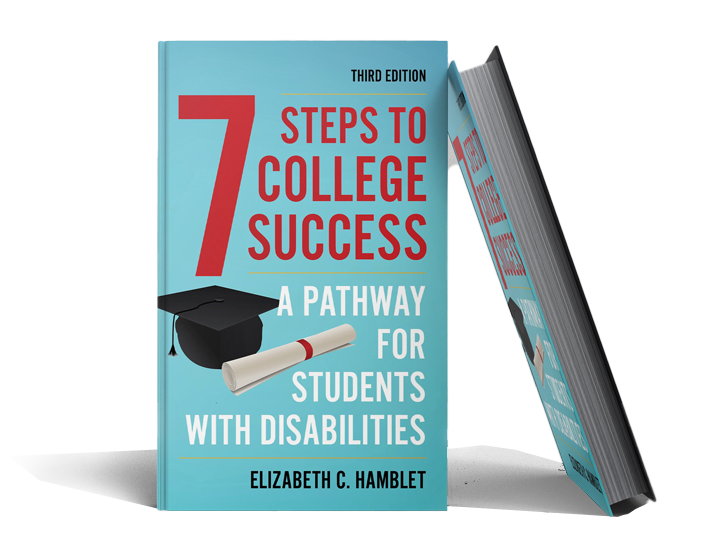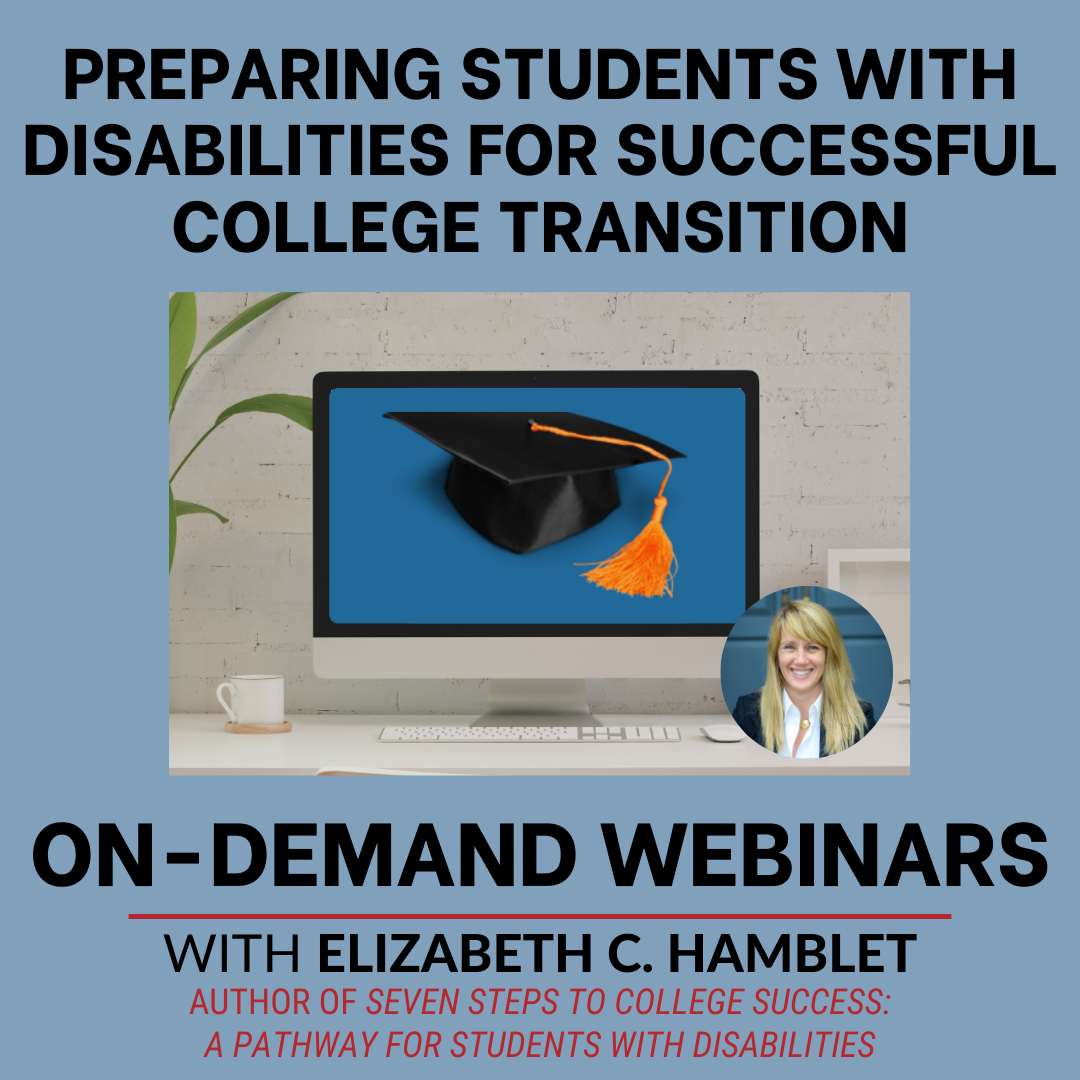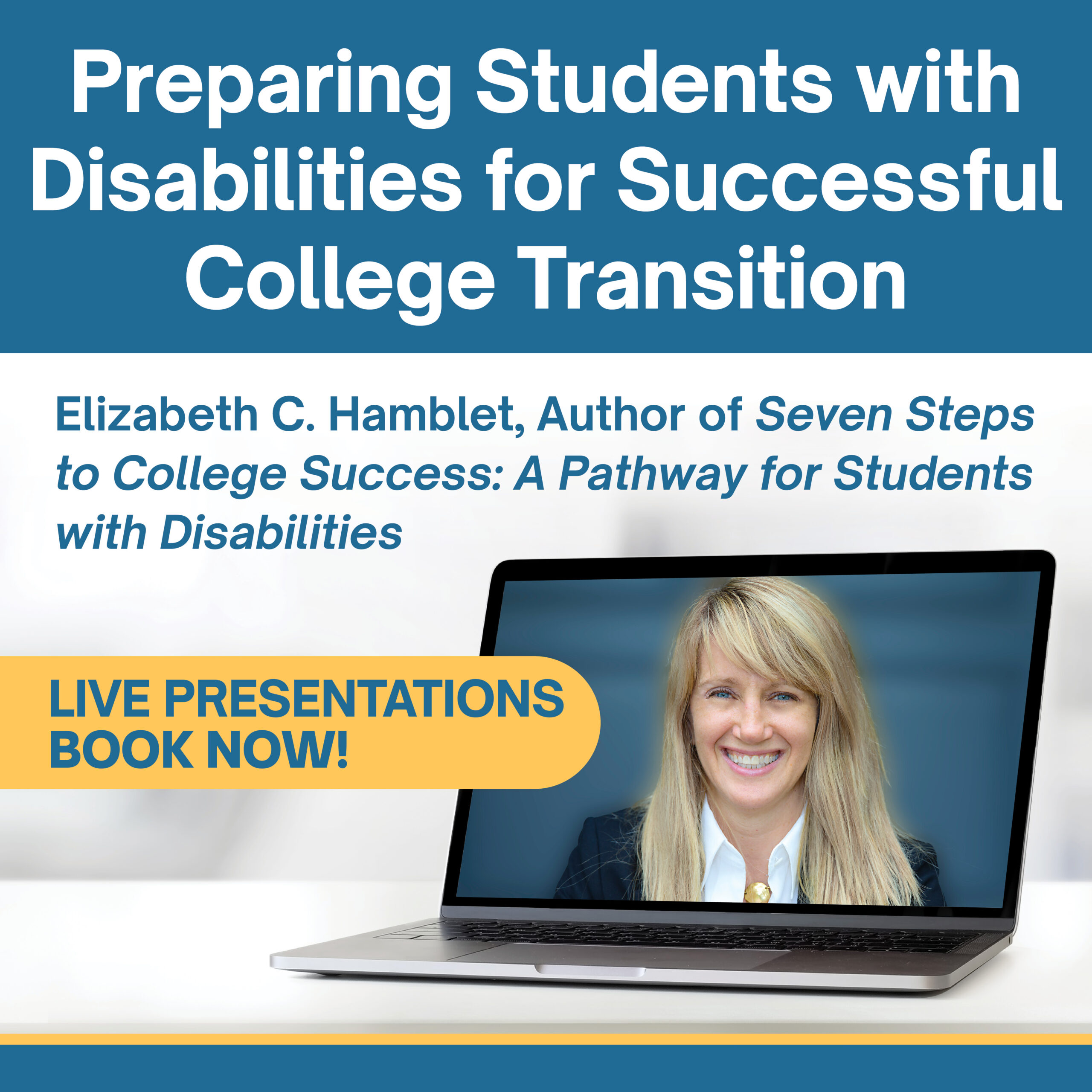Introduction
Whether I am online looking at posts people are sharing or talking to parents or professionals at my presentations, I find that there is (understandably) a lot of misunderstanding and misinterpretation of what does and doesn’t happen for students with learning disabilities (LD) and ADHD at college.
Based on what I’ve seen and heard, it seems some people either believe:
-
there are no disability accommodations available at college (or that they’re only for people with visual, hearing, or physical disabilities, not those with LD and ADHD)
OR
-
that colleges have to follow students’ high school plan and provide all of the same accommodations they received in the past
Neither of these statements is true, but I understand why people believe them.
Roots of Changing Terms: Shifting Laws and Shifting Mandates
One central fact is important to understand – neither IEPs or 504 plans are not valid once students either graduate from high school or age out of the system. (Read this post and/or watch this video to learn more.) IDEA doesn’t cover colleges, so IEPs essentially “expire” once students are out of high school, and they don’t “transfer” to college either.
I’ve spoken to people who are aware of this and told me that – because their district knows IEPs aren’t valid after students graduate – they move everyone who has an IEP to a 504 plan in their senior year of high school. They mistakenly believe that 504s are valid at college because Section 504 covers colleges.
It’s understandable that people believe this, but it is incorrect. What they don’t realize is that while colleges are covered by 504, they are subject to a different subpart than K-12 schools are. That subpart doesn’t require colleges to honor 504 plans from high school or create new ones. (Don’t worry – all colleges do provide accommodations.)
This is where I think vocabulary becomes important, as it can lead to unintentional misunderstandings. The difference in the terms used at the college level may help to point to the differences in the two systems.
“Letter of Accommodation” vs. “Plans”
When I give presentations, I state that there are no “plans” at college, meaning that students’ IEPs and 504 plans aren’t valid there, and colleges aren’t required to create a similar document – they simply have to provide accommodations. Sometimes, an audience member will say that their student attends X college and has a 504 plan.
Obviously, I can’t be sure how offices at every college in the country operate, and some may indeed put together a true plan. But I suspect that in some of these situations, there may be a misunderstanding about what these documents are and what they do.
Typically, when they approve students for accommodations, disability services offices create a letter or electronic message to inform professors of the accommodations for which students have been approved. Some offices call these notification documents a “504 plan” even though they don’t actually lay out a “plan.”
To me, the word “plan” implies that someone will help students set goals, identify steps to achieve those goals, and assess whether or not students have met them. I suspect that most of these college “504 plans” look are simply notification messages and don’t function as true “plans,” using such a definition. I think it’s important to make this distinction so that students know what to expect.
It doesn’t really matter what these colleges call the documents they write for students, as long as students know what they mean (or don’t) and can expect (or can’t). And school districts and parents should be aware that high school plans won’t be valid at college.
“Eligible” vs. “Entitled”
This brings up another point – college students with LD and ADHD are not entitled to receive accommodations simply because they had an IEP or 504 plan previously. They have to be found eligible for accommodations at their college, and even if that happens, this doesn’t mean that they are entitled to the same accommodations they received in high school. Disability services offices are allowed to decide who is eligible and what accommodations are appropriate.
Don’t worry – most students will be found eligible with no problem, and if they are using basic accommodations in high school, they’ll likely receive the same ones in college.
Eligibility is also an important idea, and vocabulary can matter here, too. While most students who have received accommodations in high school will also be found eligible for them in college, this not guaranteed. For example, students whose reports say that they have a “learning difference” (rather than a disability) and whose documentation also does not reflect a substantial limitation to learning that constitutes a disability, or who have only test anxiety (which is not generally accepted as a disability) may not be found eligible for accommodation when they attend college.
“Coordinator” vs. “Case Manager”
At some colleges, the person who serves as students’ contact and helps to arrange their accommodations is called a “coordinator,” rather than a “case manager.” (Other titles I’ve seen colleges use include Accommodations Specialist and Access Coordinator.) The term “coordinator” conveys the idea that these individuals only “coordinate” accommodations, and not that they will do things that students’ case managers did in high school, such as asking faculty about students’ progress or even checking in regularly with students. At some colleges, they might, but at many other schools, coordinators don’t perform these functions. (Students are actually responsible for starting the accommodation process by registering with the appropriate office or contact person.)
Disability “Services” vs. a “Program”
What may lead to unintended misunderstandings, too, is the name of some colleges’ disability “services” office. These offices typically provide accommodations for all kinds of disabilities, including learning disabilities, ADHD, mental health disorders, and more, and they do provide some “services” such as conversion of texts to an accessible format. But most don’t provide the kinds of “services” people might expect based on what those students received in high school.
Colleges are not subject to IDEA (which requires K-12 schools to provide specialized instruction when needed), and in the subpart that applies to colleges, Section 504 says they “need not provide…services of a personal nature” (34 C.F.R. 104.44[d][2]). While it doesn’t specifically say that tutoring by a trained specialist is one of those services, many colleges don’t offer such a support. And while schools may approve eligible students to have a one-on-one aide in the classroom, most won’t provide such an aide.
Another source of confusion may be that some offices may have titles like the “Disabled Students’ Program.” I think the word “program” can be confusing, as I think it implies a certain level of coordination and that students will have access to case managers who will create a plan, which could include access to special services rather than that students will have a coordinator who arranges their accommodations. In some cases, this title refers simply to the office that provides the required basic accommodations, not to a special program.
Some colleges do offer separate programs for students with learning disabilities, ADHD, and autism. These are truly coordinated programs, and they typically charge an additional fee to provide a real plan, access to learning specialists, etc… (See information on fee-based programs that do provide supports and structure beyond the minimum required.) However, students don’t have to sign up for these programs in order to get basic accommodations, and the accommodations that students receive through the disability services office are free.
Why Vocabulary Matters
It is important for everyone involved in students’ college transition to have an accurate sense of what they can and can’t expect in that environment. Knowledge of the terms used at the college level are different, and what those differents mean for students, should inform transition planning and preparation.




